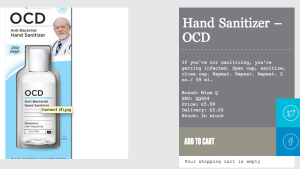Hey Incognito,
 You probably haven’t thought it through – and I’m sure you don’t mean to cause offence – but I wanted to highlight some of the problems with your OCD Hand Sanitizer product and the accompanying text.
You probably haven’t thought it through – and I’m sure you don’t mean to cause offence – but I wanted to highlight some of the problems with your OCD Hand Sanitizer product and the accompanying text.
OCD is an incredibly debilitating mental health problem. So much so that the World Health Organisation ranks it in the top 10 disabling illnesses (both mental and physical) in terms of lost earnings and diminished quality of life. Yet it remains one of the most misunderstood and trivialised of conditions.
“I’m so OCD” or “I’m a bit OCD about that” has become shorthand for “I like things to be clean” or “I like things in the right order”. Comedians joke about it. We’ve all seen a picture on social media of some slightly misaligned objects with the caption ‘This is sending my OCD crazy’. Products like this perpetuate those myths.
Jokes and misunderstandings trivialise OCD
OCD gives people constant negative, repetitive and intrusive thoughts, combined with an ongoing feeling of doubt or danger. These are the obsessions. Compulsions develop to try and quell the thought or quieten the anxiety. They can be things like repeatedly checking a door is locked, repeating a phrase over and over again in your head, checking how your body feels, cleaning or repeatedly asking for reassurance. The relief caused by completing a compulsion is usually short lived and before long the anxiety and mental discomfort caused by the obsessions and doubts rises again.
You can get stuck in an exhausting cycle of rituals and often choose to avoid places or people that may trigger their obsessions. Your day to day life is disrupted and relationships may be strained to breaking point.
Intrusive thoughts can be graphic, violent or scary. You may be very ashamed of these thoughts and spend a long time checking whether they might still be there and how you feel about them (for example ‘am I still appropriately upset by them?’). You may feel the thoughts mean there is something ‘wrong’ with you as a person – and don’t feel able talk about them or ask for help for a long time.
Every time someone says “I’m a little bit OCD” , shares an OCD joke on social media or sells a product that makes light of it, they add to the impression that OCD is trivial – even a bit comical. This makes it much harder for people to seek help or even open up to their friends and family – and for research and support services to get their share of limited funding.
Imagine if you had to explain to friends and family what cancer really was, how it affected you and that it wasn’t an amusing or comical condition. Imagine how isolating it would be if they still didn’t really understand or made conscious or unconscious judgements about what it ‘really’ was based on jokes and viral pictures on social media. Imagine if shops sold joke ‘cancer hats’ which you could put over your own hair to look as if you were having chemotherapy.
Misinformation stops sufferers seeking help
It already takes an average of over 10 years for people with OCD to seek help. Often that’s because they don’t realise that they have a recognisable condition with potential treatment options. If you’ve always been led to believe that OCD is just a quirky approach to being clean and organised then you might not realise that the intrusive thoughts or crippling doubts you’re constantly fighting are also OCD.
Language is a powerful thing – even small everyday comments, ‘funny’ product descriptions and cheeky ‘likes’. Let’s use it to learn more, to support others and to fight stigma and misunderstanding rather than perpetuate it.
Please consider reading a little more about OCD and removing this product from your shelves.
Thank you,
Clare
